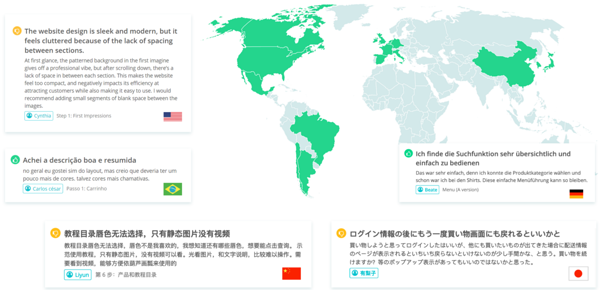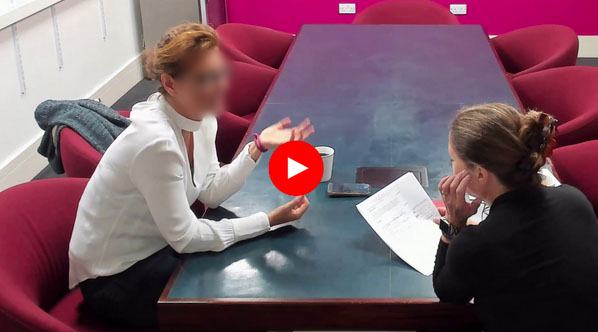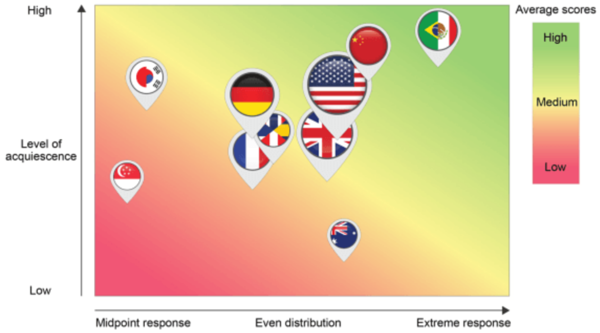December 14, 2020
International user research, what you need to know
Do you want to conduct your user research in countries other than your own market? Maybe to secure your development or to convince local teams. In any case, you are wondering how to best proceed? Let's take a look at this together.
From the very beginning, my partner Arnaud and I decided to build a bilingual remote usability testing platform in French and English. One thing led to another and we have built our experience with large international groups such as L'Oréal, LVMH, ING and Head.
Which methods in which countries?
Your objectives first? Well, almost
As we will see, there are many ways to conduct comprehensive studies. Based on your objectives, you will determine the best method to meet them. But, more than for local studies, logistical constraints - budget and planning - can weigh more on those choices.
For instance, let's say that you are in charge of the Southern European markets and you want to conduct a study with teachings in Italy, Spain, France and Belgium. If you don't limit yourself to priority countries, between the translations, recruitments and cross-analyses, you will end up with few synergies and a budget that is relatively proportional to the number of countries.
This could lead you to narrow down the number of countries and/or to encourage certain methodologies, such as remote user tests that can be quickly implemented anywhere.
User research world tour
Apart from logistical constraints, most research methodologies are available on all five continents to meet your needs for understanding users. The trick is to find the right partners, whether they are local or offer global solutions:
| Global solutions | Local Partners | |
| Face-to-face exploratory methods: individual interviews, focus groups, etc. | X | |
| Online exploratory methods | X | |
| Remote user tests | X | X |
| Quantitative surveys | X | X |
Here are two real-life examples from Ferpection's customer projects:
- Individual interviews conducted in China and the US with a local partner in China, a global recruitment partner for the US and an American moderator.
- Individual interviews conducted in Canada with a local recruitment and moderation partner, coupled with Ferpection US/UK user tests conducted by Ferpection.
"Most research methodologies are available on all five continents to meet the need to understand users."
France, a country like any other?
When we refer to international, it is actually a misnomer and you can think of France as one of the possible countries for your user research:
- With a population of 67 million, France is comparable in terms of size and consequently sampling to many countries in Europe, of course, but also in Asia and the Americas.
- Similarly, our maturity in the research market - and that of the so-called Western countries - is not so different from that of markets such as China or Mexico where there are strong local partners.
- Yet, language and cultural differences will create a distance with these local actors and the challenge will be to overcome this.
Specific difficulties related to global studies
Each study can generally be broken down into 3 stages, each with a specific focus:
- recruitment
- field study
- analysis
The art of recruiting in all countries
The recruitment stage will generally affect schedules with specific factors for the international market:
- finding local or global partners,
- additional project management,
- translation before, during and after the field study,
- coordinating the schedules of the various actors in the case of a multi-country study,
- and time lost due to time zone differences.
Never underestimate this last point. Here is an example from a real project: your local partner has hired users for a remote test. The prototype server is in Europe and the website cannot be accessed in China. Your partner was able to download the elements with a VPN and as a plan B offers to conduct the tests in his office. To do so, he needs to contact the users immediately. He writes to you at 8am local time, which is 1am in Europe! The study finally went well, and without delay, because we had anticipated this type of hazard in the schedules.
Moreover, some targeting criteria that may seem obvious to you will not be so in all geographic areas. For example, not all countries are equipped with computers, either because of the living conditions or because the consumers are already equipped with telephones. The same goes for the knowledge of English for a prototype test. In Singapore or Hong Kong, people tend to be bilingual, in Korea or Japan not at all.
Lastly, some small countries have difficulties with recruitment because the size of their population reduces the potential for hiring. Luxembourg is an example of this in Europe.
Conducting field studies in all languages
The fieldwork stage requires special attention to local characteristics. Fieldwork is the stage where you collect the opinions of respondents through a survey, a moderator, a tool, etc.
In order for this stage to be successful, the guides and questions must be written up front. Even if you have an idea of what you want to know, it is essential to work with a local person to prepare these elements, or to translate them. In fact, it is during the writing process that we will notice some cultural and linguistic subtleties that should not be missed. For example:
- In Asia, if a product is attractive, people will tend to say they own it even if it is not true. It is possible to overcome this bias through open-ended questions such as "What is the brand of your car?".
- With quantitative surveys, we can use approval scales without figures to limit the reading bias of the scores that will be found in the analysis.
Consequently, the writing technique will also play a role. Having the translation done by your local colleagues is not always a good idea, as they may not have mastered these techniques and may, without even realizing it, jeopardize certain issues.
In the same way, let your local partner conduct interviews or manage questionnaires. Unless you are truly bilingual and a native speaker, don't underestimate the risk of missing something as a foreigner. On the contrary, for moderate studies, you can work with simultaneous translations to stay close to the study.
"Cultural and linguistic subtleties that should not be missed will arise during the writing process."
Analysis: bringing together local and global
For the analysis, the challenge will be to remain neutral between the global teachings and the local customization needs.
In surveys or user tests, if the questions and scenarios match well from one language to another, it will be possible to compare data from several countries while keeping a local analysis available.
Naturally, the answers given are not always instantly comparable between countries. If a French person rarely gives a 10 out of 10, it is less of a problem for a North American. In the chart below produced by B2B International, we can see the cultural tendency of different nationalities to balance elements with the most "generous" cultures at the top right:
For exploratory methodologies, such as individual interviews and focus groups, you should have a "topline report" if you need to request it in English. With this document, feel free to discuss the study with your local partner to highlight cultural subtleties. These come up naturally by capillary action. If you are surprised by certain elements, your partner will give you the corresponding references. For example, they will be able to explain why the survey sample in China finds the red of your prototype so attractive while you were trying to make it a warning signal.
In any case, when you process teachings from several countries, you will have two types of elements: those that are common to the different countries and the others. In this second category, not everything will be related to the country itself and, after reworking, you should have two lists:
- Global teachings.
- Local teachings.
Then and only then, will you be able to make choices between these two lists and therefore modify the customization part of your offer.
Ferpection assists companies in transforming user feedback into a key success factor for their offline, online and omnichannel projects. Find out more about our local and global user research solutions here.
All articles from the category: User research | RSS




